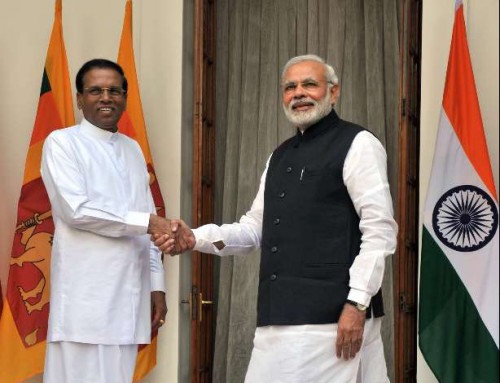
India and close neighbour Sri Lanka sought to begin a new chapter in their relations as the island nation’s newly-elected President Maithripala Sirisena held talks with Prime Minister Narendra Modi here and the two sides inked four agreements, including one on civil nuclear cooperation.
Sirisena, who arrived here Sunday evening on a four-day state visit – his first abroad after he defeated long-time president Mahinda Rajapaksa – said Modi is expected to visit Sri Lanka in March and that they are “eagerly awaiting the glorious event”, which he said would be “an honour and a blessing” to their country.
Modi, addressing the media after the delegation level talks held at Hyderabad House, said the agreement on civil nuclear cooperation was “yet another demonstration of our mutual trust”.
He said it is the first such agreement that Sri Lanka has signed and it “opens new avenues for cooperation, including in areas like agriculture and healthcare”.
Both sides held talks on the issue of peace and reconciliation process in the island nation over a working lunch.
Ties between the neighbours had come under strain under the Rajapaksa government, especially on the issue of arrest and incarceration of Indian fisherfolk and over Sri Lanka’s increased dalliance with China.
The berthing of a Chinese submarine in Colombo port had caused consternation in India.
Congratulating Sirisena on his Jan 8 election, Modi said: “India is Sri Lanka’s closest neighbour and friend. The goodwill and support of the people of India will always be with you.”
Modi also assured Sirisena of “India’s commitment to its development partnership” which would continue to cover areas, including infrastructure.
Both sides have also agreed to expand their defence and security cooperation, including in maritime security cooperation.
The four agreements inked, are on cooperation in the peaceful uses of nuclear energy, on cultural cooperation, a MoU on establishment of Nalanda University, and a MoU on cooperation in agriculture.
On the ticklish fishermen’s issue, Modi said both leaders “attach the highest importance to the issue” and have agreed for a “constructive and humanitarian approach” to it.
On boosting economic cooperation, he said in view of India enjoying a huge trade surplus with Sri Lanka, he had voiced his support “for a more balanced growth in trade in both directions” and for promoting “greater flow of Indian investments and tourists into Sri Lanka”.
The commerce secretaries of both sides are to meet soon to review the bilateral commercial ties.
“We are at a moment of an unprecedented opportunity to take our bilateral relations to a new level. This visit today has set us firmly in that direction,” said Modi.
Sirisena, stressing on the close civilizational links between the two countries, said that Hindu and Buddhist philosophy has influence in his country and that Hindu and Buddhist devotees are living very peacefully and represent the close ties.
He said during talks with Modi, both sides came to “several good conclusions to strengthen ties and strengthen the friendship and we were able to able strengthen that friendship”.
He said the friendship between the two countries will not only help build stronger relationship between them bilaterally “but in international forums India will support us and have more understanding between the two countries; building more relations and strengthening the ties, and we agreed to work on a mutual understanding, and it is very clear.”
Both sides have agreed to work closely on issues including trade, energy, defence, security, education and culture, he said.
He said his first official visit to India has “borne very fruitful results” and helped bring the relationship to “greater height” and added he believed that both sides would strengthen ties in future in the fields of defence, economic and culture.
He termed his visit a “remarkable milestone” in their ties.